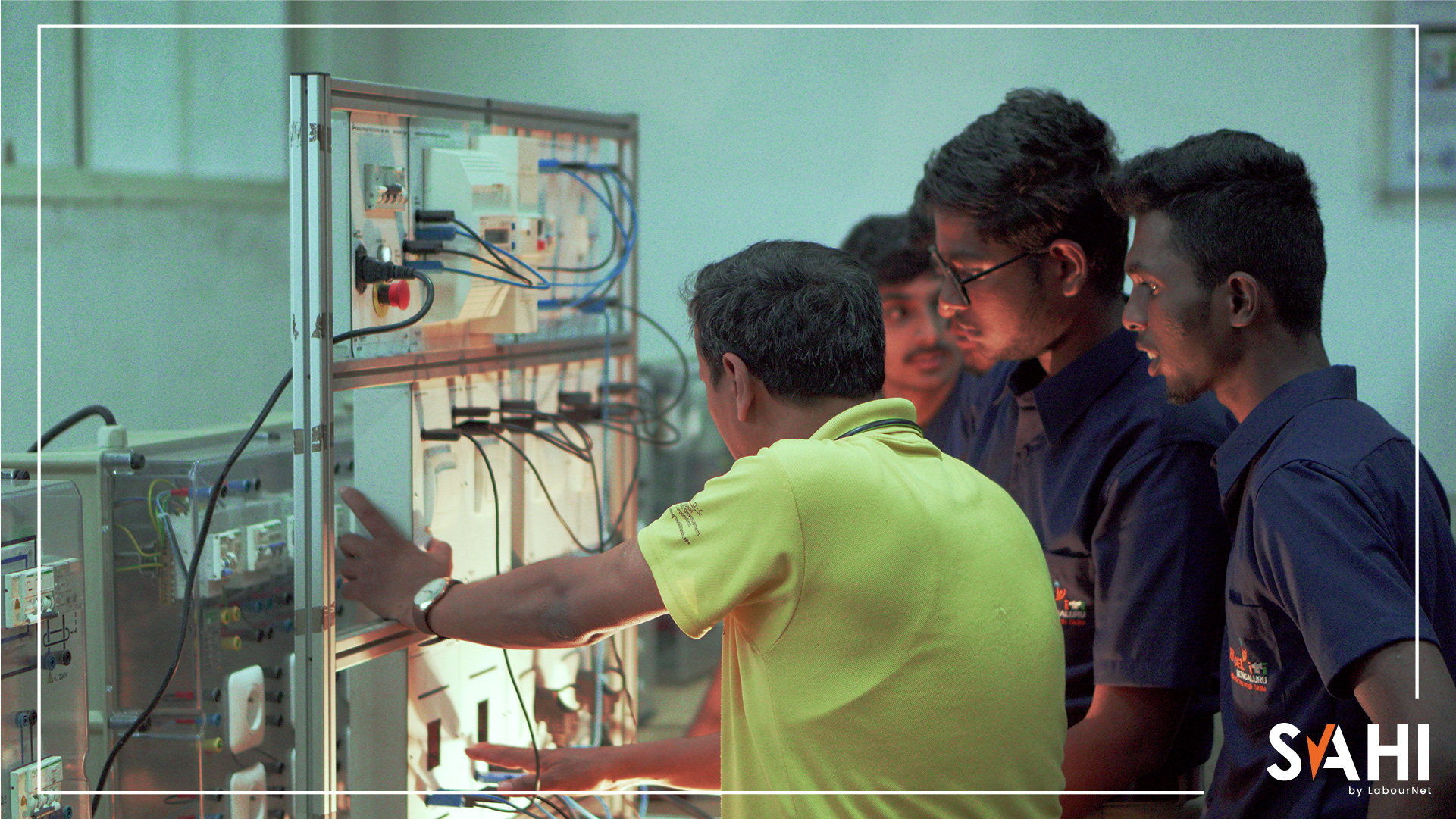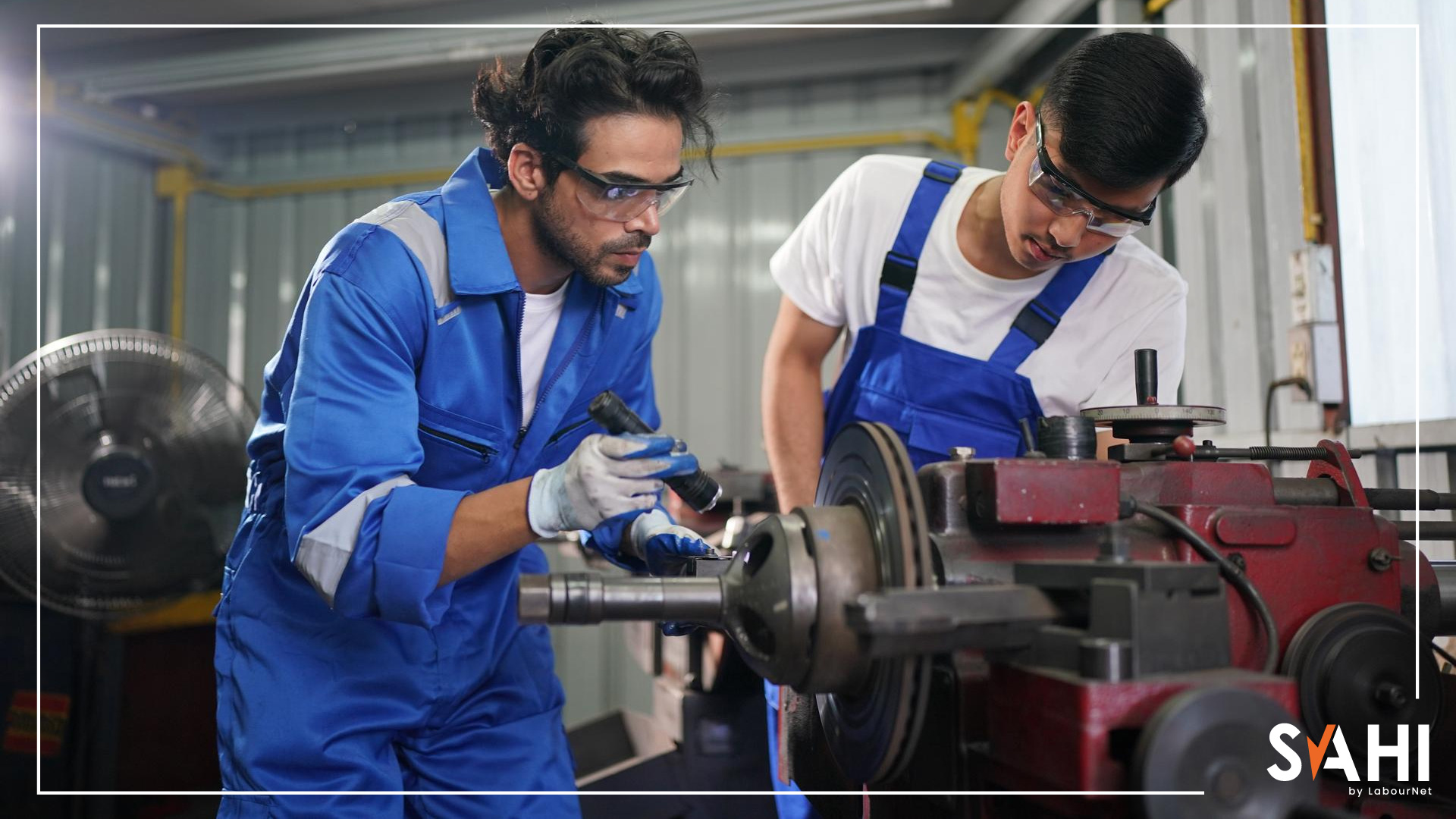The Electric Vehicle (EV) manufacturing industry is at the forefront of an automotive revolution, marked by rapid growth and technological innovation.
As countries and corporations globally pivot towards sustainable transportation solutions, the EV sector is experiencing unprecedented growth. This growth trajectory necessitates a parallel evolution in workforce competencies, making skill assessments indispensable in this dynamic landscape.
In the realm of EV manufacturing, the skill challenges are as diverse as they are complex. With advancements in battery technology, powertrain systems, and sustainable manufacturing processes, the demand for specialised skills is continually escalating.
This evolution poses a significant challenge for Learning and Development (L&D) heads in the sector. They are tasked with identifying the current skill set of their workforce and anticipating future competencies required in this rapidly evolving industry.
Highlighting the Evolving Skill Requirements in EV Manufacturing
The pivotal role of skills assessments and competency testing in enhancing training and workforce development skills in the EV manufacturing sector can’t be understated.
L&D professionals require insights and strategies for optimising workforce development skills through effective employee skills assessment. By delving into the nuances of skills assessment and its impact on work and employee productivity, they will get a comprehensive idea of the relevant skills needed for EV manufacturing.
As we explore this topic, the objective is clear. We aim to enlighten L&D professionals on how strategic skill assessments can bridge the current skill gaps and prepare their workforce for the future challenges of the EV industry.
Readiness of such sorts will help in meeting the immediate training solutions needs. Thus, it will help them shape a workforce that’s agile, competent, and ready to drive the EV sector towards new heights of manufacturing excellence.
The Importance of Skill Assessments in EV Manufacturing
The EV sector, known for its rapid technological advancements and evolving industry standards, demands a workforce that is skilled, adaptable, and future-ready.
This is where strategic skill assessments and competency testing become crucial.
Skill assessments in EV manufacturing play a pivotal role in aligning the workforce with the industry’s constantly evolving needs.
They are the cornerstone of employee productivity and work productivity, which serves as a barometer to measure and improve the competencies essential for manufacturing innovation and excellence.
According to a report by the International Labour Organization, the transition to electric vehicles is expected to create 10 million jobs worldwide in the EV industry. This underscores the need for a skilled workforce adept at handling new technologies and processes.

The role of skills assessment tests in this sector extends beyond mere evaluation.
They are instrumental in charting a clear pathway for employability skills development. As a result, such assessments ensure that the workforce is proficient in current technologies and primed for future innovations.
This forward-thinking approach is vital in a sector where advancements in battery technology, electronic systems, and sustainable manufacturing practices are the norm rather than the exception.
What is The Impact of Skill Assessments on Workforce Efficiency?
Skill assessments provide invaluable insights into the existing skill levels and highlight areas requiring enhancement, enabling L&D professionals to tailor their training solutions to bridge these gaps.
This targeted approach to skill development ensures that training initiatives are a strategic investment yielding tangible returns. As per a study by McKinsey & Company, companies that excel in skill-building are more effective at meeting their performance targets.
This statistic highlights the direct correlation between strategic skill assessments and organisational success.
In essence, the role of skill assessments in the EV manufacturing industry transcends mere competency evaluation. They are a strategic tool in workforce development skills, shaping a workforce that is agile, proficient, and aligned with the industry’s futuristic vision.
By embracing comprehensive employee skills assessment, EV manufacturers can foster a culture of continuous learning and improvement. This proves crucial for maintaining a competitive edge in this dynamic sector.
Addressing the Pain Points: L&D Challenges in EV Manufacturing
The rapid pace of technological advancements, coupled with the specialised nature of skills required, places a significant burden on Learning and Development (L&D) professionals.
As such, they face a unique set of challenges in the Electric Vehicle (EV) manufacturing sector. They are tasked with ensuring that the workforce remains competent and adaptable, a goal that is often easier said than done.
One of the primary challenges in this sector is the continuous evolution of skills.
As new technologies emerge in EV manufacturing, from advanced battery systems to sophisticated electronic controls, the skill set required for employees continually shifts.
This dynamic landscape makes it challenging for L&D professionals to design training solutions that are both current and comprehensive. Moreover, the need to balance technical skills with soft skills like critical thinking and adaptability adds another layer of complexity to their role.
Can Strategic Skill Assessments Address These Issues?
Strategic skill assessments emerge as a potent solution to these challenges.
By implementing thorough skills assessment tests and competency testing, L&D professionals can gain a precise understanding of the existing skills within their workforce and the gaps that need bridging.
This clarity is crucial for designing targeted training programs that are aligned with both current and future industry needs. Hence, it enhances employability skills development.
Furthermore, strategic skill assessments help in maximising the training ROI. By identifying the specific areas where training is needed, organisations can invest more wisely in their L&D initiatives.
Such a targeted approach improves work productivity and ensures that the training is relevant and impactful, addressing the exact needs of the workforce.
In conclusion, the role of strategic skill assessments in the EV manufacturing sector cannot be overstated.
They provide L&D professionals with the insights needed to develop effective training programs. It ensures that the workforce is just equipped to handle today’s challenges while being prepared for the future advancements in this rapidly evolving industry.
This proactive approach to skill development in India is key to maintaining a competitive edge in the dynamic world of EV manufacturing.
Best Practices for Skill Assessments
Skill assessments in the Electric Vehicle (EV) manufacturing sector are about identifying competencies, while shaping a future-ready workforce.
To achieve this, there are specific best practices that need to be followed. These practices ensure that the skills assessment test is effective and aligned with the latest industry trends and technologies.
Comprehensive and Customised Assessment Design
The first step in conducting a successful skills assessment test is to develop a comprehensive framework that is tailored to the unique needs of the EV manufacturing sector.
This involves understanding the specific competencies required in various roles, from technical proficiency to soft skills like problem-solving and adaptability.
For instance, a well-structured employee skills assessment should encompass both the technical know-how of EV manufacturing processes and the soft skills necessary for innovation and teamwork.
Utilising Technology-Driven Assessment Tools
In today’s digital era, integrating modern tools and technologies into the assessment process is vital.
Advanced tools like AI-proctored assessments and virtual reality simulations can provide a more accurate and immersive evaluation experience.
These technologies make the assessment process more efficient, aligning it with real-world scenarios that employees might face in the EV industry. For instance, AI can be used to automate and make the assessment process more efficient for a large workforce.
Regular and Continuous Assessments
Competency testing in the fast-evolving EV sector should not be a one-off event.
Regular and continuous assessments are crucial for keeping pace with the ever-changing industry standards and technological advancements. This approach allows for timely identification of skill gaps and provides ongoing opportunities for workforce development skills enhancement.
Data-Driven Decision Making
Data plays a pivotal role in shaping effective skill assessments.
By leveraging data analytics, organisations can gain insights into workforce competencies, identify trends, and make informed decisions about training and development needs. This data-driven approach ensures that the focus remains on areas that will most significantly impact employee productivity and work productivity.
Feedback and Follow-Up
A key aspect of any skill assessment process is the feedback mechanism. Providing constructive feedback to employees post-assessment helps in identifying areas for improvement and developing targeted training solutions.
Additionally, follow-up assessments can gauge the effectiveness of training programs and ensure continuous skill development.
Aligning Assessments with Industry Standards
Finally, it’s crucial to align skill assessments with current industry standards and future trends in the EV manufacturing sector.
This ensures that the workforce is not just competent in today’s skills but is also prepared for tomorrow’s challenges. For instance, as EV technologies evolve, assessments should be updated to include new competencies and skills relevant to emerging industry trends.
By following these best practices, organisations in the EV manufacturing sector can ensure that their skill assessments are comprehensive, accurate, and aligned with the dynamic nature of the industry.
This strategic approach to skills assessment paves the way for enhanced workforce efficiency, adaptability, and overall industry excellence.
Benefits of Strategic Skill Assessments

Strategic skill assessments in the Electric Vehicle (EV) manufacturing sector play a pivotal role in shaping a competent and forward-thinking workforce.
When conducted effectively, these assessments yield a plethora of benefits, significantly contributing to the overall growth and sustainability of the industry.
Enhanced Workforce Competency and Adaptability
The primary advantage of thorough skill assessments is the enhanced competency they bring to the workforce.
By accurately identifying the skills and knowledge gaps, these assessments enable targeted training solutions, ensuring that employees are well-equipped to handle the demands of the evolving EV sector.
This competency testing directly translates into increased employee productivity and work productivity.
According to a PwC survey, 77% of CEOs say that the lack of key skills is the biggest threat to their business, highlighting the critical role of skill assessments in workforce development.
Improved Training ROI and Alignment with Industry Needs
Strategic skill assessments ensure that training programs are effective and cost-efficient.
By pinpointing the exact areas where training is required, organisations can allocate resources more effectively. This will lead to a better return on investment (ROI) in training and development.
The targeted approach ensures that training is perfectly aligned with both the immediate and future skill requirements of the industry. Studies have shown that companies who invest in comprehensive training programs enjoy a 24% higher profit margin compared to companies who spend less on training.
Preparing Workforce for Future Technologies
In an industry as dynamic as EV manufacturing, staying abreast of technological advancements is crucial.
Strategic skill assessments are instrumental in preparing the workforce for emerging technologies and industry trends. They provide insights into the future skill requirements, allowing organisations to proactively upskill their employees.
This foresight is essential for maintaining competitiveness in a sector where technological obsolescence is a constant risk.
Promoting Employability and Career Growth
Skill assessments also play a significant role in employability skills development.
By identifying individual skill sets and potential areas of improvement, these assessments pave the way for personalised career development plans. This enhances the employability of the workforce and contributes to their overall career growth and job satisfaction.
Strengthening Industry-Academia Collaboration
Finally, effective skill assessments facilitate a stronger alignment between industry requirements and academic curricula.
This synergy ensures that new entrants into the workforce are better equipped with the relevant skills and knowledge. It thereby reduces the skill gap prevalent in the EV manufacturing industry.
In conclusion, strategic skill assessments are a tool for measuring competencies, while proving a cornerstone for building a robust, adaptable, and future-ready workforce in the EV manufacturing sector.
By investing in these assessments, organisations enhance their operational efficiency and contribute to the larger goal of sustainable and innovative growth in the EV industry.
The Role of Skill Assessments in Achieving Manufacturing Excellence
The journey through the various facets of skills assessment tests and competency testing has underscored their critical role in shaping a workforce.
Such a workforce is competent and adaptive to the fast-evolving landscape of EV manufacturing.
Skill assessment isn’t just terms but represents the integral component of a successful EV manufacturing strategy. These elements collectively contribute to building a robust and future-proof workforce.
Strategic skill assessments provide a clear pathway for identifying skill gaps and aligning training programs with the industry’s rapidly changing needs.
By leveraging these assessments, L&D professionals in the EV sector can ensure that their workforce is meeting the current demands while being prepared for future technological advancements.
This forward-thinking approach is essential for maintaining a competitive edge in a sector where innovation and adaptability are key.


